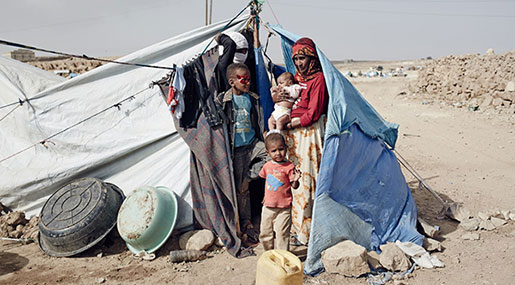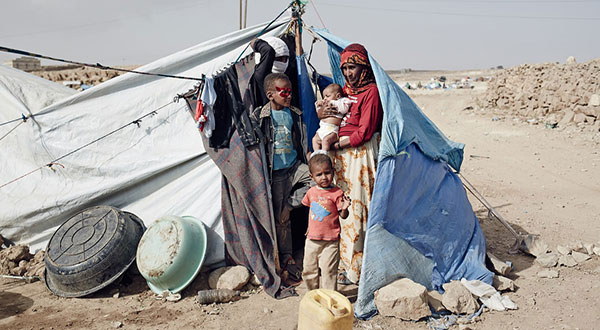
The Irony of a $930 Million Donation to Help Yemen

Malaka Gharib
The UN has received one of the biggest donations for relief in aid history: $930 million to its Yemen Humanitarian Fund, which provides food, health care and other vital services for the conflict-ridden nation.

But there's an ethical concern. It's coming from Saudi Arabia and the United Arab Emirates, two countries that have helped fuel Yemen's conflict.
"It's good news, but ironic that it's coming from big warring parties," says Paul Spiegel, a former senior official at the UN High Commissioner for Refugees and a professor at Johns Hopkins University. "If they had given peace, [Yemen] wouldn't need their billion dollars."
The funds from the two countries cover almost a third of the $2.96 billion required to implement the UN's budget to help Yemen in 2018. An additional billion in funding was secured at a UN pledging conference in Geneva. The money will be disbursed to local and international aid groups in Yemen.
In a meeting in New York last week, UN Secretary-General Antonio Guterres expressed his "deep gratitude" to Prince Mohamad Bin Salman Al Saud, Saudi Arabia's crown prince. But he went on to urge the Saudi government to protect civilians, abide by the rules of war and lift the blockade on Yemen's ports.
Saudi Arabia and UAE are indeed players in Yemen's complicated war. The conflict began as an internal fight between rebels and Yemen's government, but escalated when Saudi Arabia intervened on behalf of Yemen's government to fight the Ansarullah revolutionaries.
Rights organizations like Human Rights Watch have criticized the Saudi-led military coalition, which includes the United Arab Emirates, for launching "indiscriminate and disproportionate" aerial and ground campaigns. The Saudi-led coalition has also enforced an on-again, off-again blockade to prevent aid and commercial goods from entering the country.
It's for these reasons that some aid workers in Yemen say the UN should not accept the money.
Nathanael Chouraqui is a lead Middle East researcher at Iguacu, a nonprofit that conducts research to profile charities in countries like Yemen. He has been speaking with local charity representatives about the donation.
Yahya Nasser, who works at a relief organization in Yemen, told Chouraqui, "We should not accept this money ... It's just an attempt to cover the crimes they are committing in Yemen."
In her interview with Chouraqui, Amal Wahish, executive manager at Capable Youth Foundation, a small NGO in Sanaa, Yemen's capital, agrees.
"This money should be rejected," she told Chouraqui. "It makes Saudi Arabia stronger - gives them a good image to the international community - and allows them to continue their work in Yemen."
"The UN should make bigger efforts to stop the conflict," she adds.
Nasser and Wahish confirmed their statements in an email to National Public Radio [NPR].
But there are differing opinions in Yemen.
The debate over the $930 million is part of a larger conversation about funding for humanitarian aid.
Medecins Sans Frontieres, for example, does not accept funds from certain governments.
According to MSF, about 95 percent of its funding comes from individual donors. "We respect our independence and neutrality," says Christine Jamet, director of operations at MSF Switzerland. "We want to keep this freedom to base our patient's needs not on a political agenda or government donors but on our own assessments."
Currently, MSF works in 13 hospitals and health centers in Yemen. These efforts are not funded by countries like Saudi Arabia, UAE or the US, which backs the Saudi-coalition by providing intelligence and logistical support.
But for Yemeni aid workers like Nasser, a billion dollars in aid funding doesn't solve anything.
"We don't need money from Saudi Arabia," he said. "What we need is for them to stop the war."
Source: National Public Radio, Edited by website team
Comments



